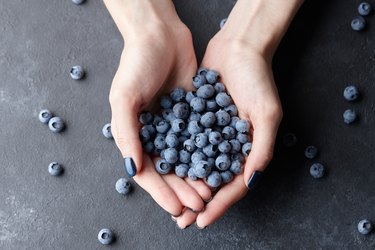
Stomach ulcers can be painful. While the American College of Gastroenterology does not recommend any specific diet for a stomach ulcer, some diet alterations may help fight the growth of Helicobacter pylori (H. pylori), which is a known cause of ulcers. Ulcers are open wounds or sores that occur in the lining of the stomach.
First Signs of an Ulcer
Video of the Day
It's common for people with ulcers to have no symptoms at all. For those who do have symptoms, common symptoms of an ulcer include abdominal pain, vomiting, bloating and nausea.
Video of the Day
It's important to seek medical attention if you have these symptoms. An ulcer can go unnoticed due to lack of symptoms and can cause a life-threatening hemorrhage. A slow-bleeding ulcer can cause stool to become jet black, known as melena. Passing out or feeling lightheaded is also a symptom of a slow-bleeding ulcer, as the loss of blood over time can cause anemia. These symptoms are life threatening and need immediate medical attention.
A study published October 2014 in Gastroenterology evaluated the risk of a peptic ulcer bleed in a case-control study. Authors found that a history of peptic ulcers, H. pylori infection, alcohol consumption, low-dose aspirin and the use of nonsteroidal anti-inflammatory drugs (NSAIDs) were independent risk factors for a peptic ulcer bleed. They also noted eradicating H. pylori reduced the risk of a peptic ulcer bleed.
Treating an ulcer depends on the cause of the ulcer. Ulcer treatment includes medications that include proton pump inhibitors, H2 blockers, antibiotics and potentially cauterization of the ulcer to prevent additional bleeding. There are also recipes for ulcers and gastritis that help treat ulcer symptoms.
While there is no specific stomach ulcer diet menu recommended for someone with an ulcer, reducing the growth of ulcer-causing bacteria is possible with some foods. These foods include apples, blueberries, blackberries, radishes, cherries, bell peppers, leafy greens, yogurt, kefir, miso, sauerkraut, olive oil, honey, turmeric, garlic, carrots and broccoli. You can make some ulcer-friendly recipes from these ingredients as well.
These foods have been shown to combat the growth of H. pylori, a known cause of stomach ulcers. A study published July 2016 in Przeglad Gastroenterolgiczny found these foods contain substances with a potent antibacterial activity to fight against H. pylori.
Foods such as yogurt, kefir, miso, and sauerkraut provide probiotics. Consuming probiotic foods when you have an ulcer is important. People with ulcers are required to take antibiotics as part of their treatment and recovery. Ulcers frequently come with symptoms of acid reflux. Avoiding coffee, chocolate, spicy food, alcohol, acidic foods and caffeine will help to reduce symptoms of acid reflux during recovery.
Sample Ulcer Diet
While there is no specific stomach ulcer diet menu recommended, the Myrtue Medical Center recommends the following guidelines:
- Avoid alcohol, cigarette smoking, aspirin and other non-steroidal anti-inflammatory agents.
- Avoid eating soon before bedtime.
- Avoid caffeine, chili powder, garlic and black pepper to reduce gastric secretions.
- Avoid any foods that cause discomfort. (This is different for everyone.)
- Eat a balanced diet that includes dairy products, lean protein or protein alternatives, fruit, nuts and seeds, and whole grains.
- Limit high fat and fried foods.
The Bottom Line
There is no specific diet recommended for someone with an ulcer; however, reducing the growth of ulcer causing bacteria is possible with some foods. These foods include apples, blueberries, blackberries, radishes, cherries, bell peppers, leafy greens, yogurt, kefir, miso, sauerkraut, olive oil, honey, turmeric, garlic, carrots and broccoli. However, an antibiotic is the only way to eliminate the ulcer-causing bacteria.
Stomach ulcers can be life threatening if left untreated. Seek medical attention immediately if you believe you have a stomach ulcer.
- Przeglad Gastroenterolgiczny: "Diet and Helicobacter pylori infection"
- Mayo Clinic: "Peptic ulcer"
- Myrtue Medical Center: "Bland Diet Peptic Ulcer"
- International Wound Journal: "An overview of the relationship between anaemia, iron, and venous leg ulcers."
- Gastroenterology: "Risk of peptic ulcer bleeding associated with Helicobacter pylori infection, nonsteroidal anti‐inflammatory drugs, low‐dose aspirin, and antihypertensive drugs: A case‐control study"